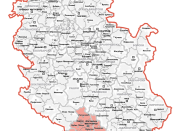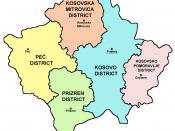Deconstructing the Final Status:Kosovo Case StudyBy:Ivan à ½ivkovi?Dr. Ben MullerCritical Security Studies349With Kosovo being an issue of human tragedy it is essential to point out that the ultimate goal of this study is to evaluate the document presented to the United Nations Security Council and criticize it within the context of critical security studies. It is hoped that through this criticism one can come closer to a solution that will offer a better future than the one that is being proposed. David Campbell's "National Deconstruction" provides an essential tool in viewing this document from a critical perspective but it does not introduce any tangible method for this specific issue. Ethics, although essentially an idealist pursuit in a realist world, needs to be the ethos of any kind of territorial partition and this is where Allan Buchanan's book "Secession" may be applied to some degree. Since secession involves transfer of capital, natural goods, public goods and private goods, it needs to be justified and rationalised so that the waves caused by such a turbulent move do not reverberate and turn into a tsunami which may endanger the viability of Kosovo or even statism as a concept.
The citizens of Kosovo and Metohija find themselves as possible 'precedents' in the realm of international relations. This troubled region finds itself at a crossroads where its future, whether within the state of Serbia or partition and independence, will be decided in a forum void of any input from people affected the most, namely the ones living in the region. The Kosovo proposal, drawn up by Mr. Martti Ahtisaari, is not in the best interest of the people living in this troubled region. Although the proposal champions the idea of multiculturalism and tolerance as its ultimate goal, the said document in its parables contains a...


